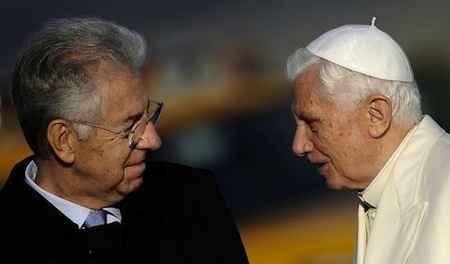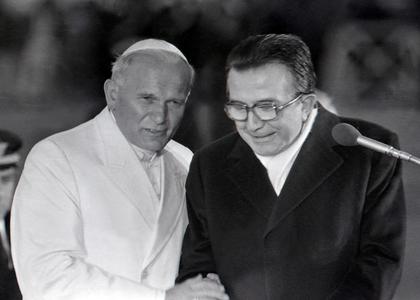The shock news earlier this week that Pope Benedict XVI (pictured above, right, with Italian prime minister Mario Monti) would step aside as the leader of the Roman Catholic Church on February 28 has overshadowed the campaign currently taking place in advance of Italy’s general election — an election that will take place on February 24 and 25, just hours before the first papal abdication in six centuries.![]()
![]()
So what does that mean for Italy’s election?
First and foremost, it means that much of the week’s media coverage has been focused on Benedict XVI (above all on Ash Wednesday, of all days) in Italy, not the election campaign. It’s hard to know exactly what the result of that has been; perhaps it may freeze in place the state of the campaign from the end of last week, and perhaps it might even staunch the incremental momentum of Silvio Berlusconi’s Popolo della Libertà (PdL, People of Freedom), and Beppe Grillo’s Movimento 5 Stelle (M5S, the Five Star Movement), both of which were seen inching up in support in polls at the end of last week.
Substantively, the Vatican has long been one of the most powerful forces in Italian politics, and its long-standing support for Italy’s former Democrazia Cristiana (DC, Christian Democracy) allowed it to govern Italy uninterrupted from the postwar era until the ‘Tangentopoli’ (‘Bribesville’) scandal in 1993 that scrambled Italian politics and begat a new ‘second republic’ in Italy.
In many ways, the Catholic Church and the former Partito Comunista Italiano (PCI, Italian Communist Party) were the two major, and counterbalancing, ideological and social bulwarks of postwar Italy — given that the Christian Democrats always found ways to foreclose the avenues of power to the Communists, the Communist Party became as much a cultural and social force as a traditional political party.
Many organizations associated with the Catholic Church became booster organizations for the Christian Democrats as well — the Christian Democrats shared much in common with the previously Catholicist party, the Partito Popolare (Popular Party), which was disbanded in 1926 shortly upon the rise of Benito Mussolini to power. The social organization Azione Cattolica (Catholic Action), which was associated with the Church and not actively engaged in politics (and therefore not disbanded during the fascist era), quickly swung behind the Christian Democrats in advance of the 1946 general election that swept Alcide De Gasperi to power.
That support held firm for 30 years, and in the 1976 and 1979 elections, the closest that the Communists ever came to winning an election in Italy under longtime leader Enrico Berlinguer, Catholic groups also played a key role. Comunione e Liberazione (Communion and Liberation), a traditionalist and political Catholic movement (very closely associated, by the way, with longtime and now outgoing Lombardy regional president Roberto Formigoni) were crucial in holding back the Communist gains in the late 1970s, despite having mobilized an unsuccessful effort in the 1974 referendum to roll back Italy’s 1970 law allowing divorce.
The Catholic-DC alliance was cemented anew in 1979 with the elevation of the Polish cardinal Karol Wojtyła (pictured below with former prime minister Giulio Andreotti) to the papacy in 1979 as John Paul II. In a world where U.S. foreign policy interests were keen on keeping Italy’s Communist Party out of office during the Cold War, and where John Paul II would become in many ways a vital spiritual warrior against the Soviet Union’s officially atheist and communist domination of Eastern Europe, it was clear that the Vatican’s full political power (and the United States’s considerable influence) would remain behind the Christian Democrats until the Iron Curtain fell.
For what it’s worth, the Vatican has all but endorsed prime minister Mario Monti and his centrist coalition — the Vatican’s chief newspaper, L’Osservatore Romano and a semi-official mouthpiece for the Holy See, announced its support for Monti in late December 2012:
È in sintesi l’espressione di un appello a recuperare il senso più alto e più nobile della politica che è pur sempre, anche etimologicamente, cura del bene comune. [Monti’s campaign is in synthesis the expression of a call to return to the highest and most noble sense of politics which exists, as always, even at a etymological level, for the common good.]
The support came days after Benedict himself seemed to indicate a veiled preference for Monti in his Christmas message to Italians:
The pope, in his Christmas greetings in 65 languages, said in his special message to Italians that he hoped the spirit of the day would “make people reflect, favour the spirit of cooperation for the common good and lead to a reflection on the hierarchy of values when making the most important of choices.”
In the past, the Vatican has generally supported Silvio Berlusconi and his centrodestra (center-right) coalition in government to the detriment of Italy’s center-left. In 2008, former prime minister and senator for life Giulio Andreotti, a longtime fixture in Italian politics (he even has his own biopic!), is said to have sunk prime minister Romano Prodi’s government — on the Vatican’s orders — by opposing Prodi’s attempt to pass a law in the Italian state to give unmarried couples (including same-sex couples) special health, welfare and inheritance rights.
But this time around, in light of Berlusconi’s various bunga bunga scandals — including the solicitation of sex for money from allegedly underage, North African girls — it would hardly seem befitting the family values of the Catholic Church to endorse such a tawdry candidate.
All the same, the Vatican’s power, in Italy as elsewhere in an increasingly secular Europe, isn’t what it once was, and its stances on contraception, abortion and same-sex marriage stand at odds with the majority of Italian and European voters.
So even if Benedict XVI had a vital grip on the papacy and were willing to engage in a sustained, long-term effort, it’s not clear that the Vatican could necessarily swing the vote significantly towards Monti, and even in an alternative universe with a more engaged pope or in the event that a successor to Benedict XVI had been chosen prior to the election, it’s doubtful that the Vatican could have — or would have — swung more actively into political action.
Given that Benedict XVI is meeting with Monti today, there may well be a benefit to Monti through his association with a pope that’s now certain to dominate headlines through the rest of the election, but it certainly won’t be enough to pull Monti’s coalition, currently polling in fourth place, to victory. Continue reading What the papal abdication means for Italy’s upcoming general election

